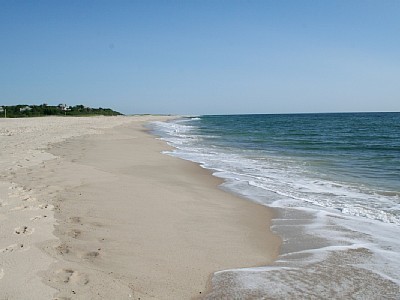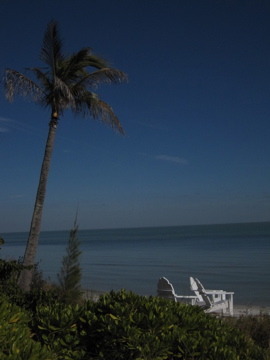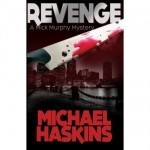Mike Jastrzebski's Blog, page 86
July 15, 2011
Things Change

The Intrepid Seadog Chip
I know that you are expecting to read a blog today by Christine Kling, but for the second night in a row she just did a face plant in the forepeak bunk. It's up to me to fill in for her. Let me introduce myself. I'm Chip, the Intrepid Seadog.
See the captain had a pretty rough 36 hours out there, not to say that I had it so easy, but I did get a bit more sleep than she did. And she wrassled that steering wheel and cranked on those winches so much that her typing fingers just aren't up to blogging. I'm a two-pawed typist, but I'll just have to do.
We left Foxtown in the Bahamas on Wednesday morning and since the captain had hoisted the little boat up onto the back of the big boat, she didn't even take me in for my morning sniff and poop.
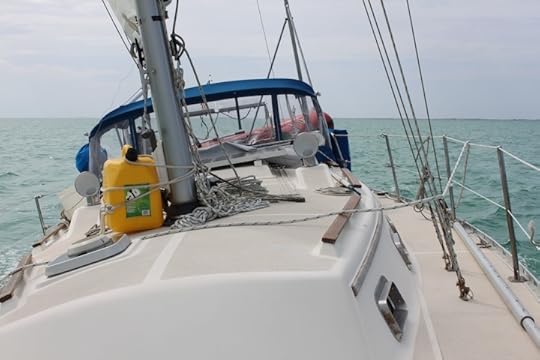 Once we got underway, she hooked my leash to my harness — which naturally got me all excited — and she walked me up onto the foredeck. I looked back at her as if to say, "Really? You expect me to go up here? With you watching?"
Once we got underway, she hooked my leash to my harness — which naturally got me all excited — and she walked me up onto the foredeck. I looked back at her as if to say, "Really? You expect me to go up here? With you watching?"
All afternoon the captain kept running around putting sails up and taking them down just before big black clouds rained on us. Then when she would put them all up again, a little later she'd start yelling "son of a bitch." My ears perked up as if to say, "You rang?" but it seems she wasn't talking to me. She took down the sails and it started raining again. I pretty much slept through most of the rain because it cooled off and because the boat wasn't leaning over.
The problem came just about sunset when the boat really started to do some tricks — you know, like lie down, shake, and roll over. All the sails were up and I could hear lots of water noises. I know they call me the Intrepid Seadog, but I've got to admit, I do get a little scared sometimes. Especially when the wind blows really hard. Okay, and I get seasick, too. Yeah, all right, I will admit it. I was puking. Puddles of half-digested kibble everywhere. This time when the captain said, "Son of a bitch," I think she was talking to me. Or about me, anyway.
Then everything started crashing and banging and the boat was really leaning over and stuff fell on top of me. I couldn't get out from under this pile of chart books and the captain didn't come down to save me. At least not right away. When she finally came down and rescued me, she apologized. She said the boat couldn't steer itself anymore and she had to stay outside all night. That was the last I saw of her for about the next 10 hours. Sometimes I heard her yelling out there. It sounded like she was howling at the moon. I know what that feels like.
The captain had told me we were going to do three nights at sea to go to a place called Charleston, but in the morning, she changed her mind, and we spent the whole day getting to the place called Port Canaveral.
She stayed out there hanging onto the wheel all day. I gotta admit, I was pretty glad to see grass when we got tied up last night. The captain seemed pretty happy to see her pillow after over 40 hours without sleep.
The thing I like most about my captain is that she makes plans, but when things change, she can turn the leash in a new direction.
I've slept under the captain's feet at her computer table for many years now. She thinks I don't understand, but I know she's telling stories. I hear her talking to herself using the voices of the people in the stories. She makes plans for her stories — she even writes down the plans, but sometimes those plans have to change, too. I know if it's not working– if she's calling out to me, her own darling son of a bitch too much, then I know she changes the story. Sometimes she says she has to throw the plan overboard and go against the current just like she did on the boat the other night.
I don't know where we're going next or when the boat's going to get fixed or when the next story is going to be finished — but I think that's what makes life with the captain interesting. . . at least it is when she's not snoring in the forepeak.
As the captain says . . .
Fair winds!
Chip
the Intrepid Seadog
Share on Facebook
July 14, 2011
Christine Kling's post will be delayed until Saturday.
I received a call from Christine yesterday. While crossing ftom the Bahamas to the Carolinas, Christine's Autopilot gave out and she was forced to steer her boat my hand. By the time she managed to get her boat safely into a port she had gone 36 hours without sleep. Since she did not have internet access, she will post Saturday instead of today. We're sorry about this, but since Christine always has something interesting to say I hope you'll stop by tomorrow and check out her post.
Mike Jastrzebski
Share on Facebook
You have a *WHAT*?
C.E. Grundler
[image error]
Over the years my husband and I have spent countless hours on the phone, trying to track down various components for our 32' 1977 Cheoy Lee trawler. And the responses we hear are consistently the same.
"What kind of a boat is that?"
"Never heard of them."
"I thought they built only sailboats/megayachts/ships."
Actually, Cheoy Lee did, for brief span of years, build various small trawlers. But it isn't just the boat itself. The parts she was built with lead to an equal amount of dead ends.
"What kind of helm pump? Oh. Can't be rebuilt. You got to replace it."
No. The Wagner 701 can be rebuilt.
"An inner cutlass bearing? No such thing."
That's odd, because I'm looking at one right now. Only it isn't in a standard size. The inner diameter is for a 1.75" shaft, but no standard outer diameters available match the dimensions of my apparently very unique stuffing box/inner cutlass bearing housing, which a friend with a machine shop will be boring out this weekend so we can use a standard size cutlass. The same goes for the rudder bearing.
I suppose this should be expected when one buys an old boat of unusual pedigree, and I did anticipate it to some extent, though as with all things on a boat, the reality of the situation often far surpasses what you first imagine. This has become amusingly apparent whenever I'm on the phone with some supplier or another, who, in an attempt to find answers Googles "Cheoy Lee" + whatever part we're discussing.
"Oh, hey," I'm told, "there's a web site here with someone doing just what you're talking about, with lots of pictures and information." Every time, without fail, it's my site and my boat they're looking at.
If there is a positive to this all, and I always try to see the positive side, as a result, we've become highly skilled at rebuilding what can't be rebuilt, repairing what can't be repaired, and coming up with creative and innovative solutions to the unsolvable. We've had to design our own tools and friends have welded up massive wrenches to our specs. We've devised ways to remove long-frozen parts, to adapt things in the oddest ways, to fix what can't be fix, and ultimately, to gain a sense of humor about it all in the process.
Share on Facebook
July 13, 2011
Professional Help
We speak a lot on writeonthewater about the do-it-yourself approach. That seems to be working well for our authors here. But, for me, I knew I didn't have the time or know-how to market my own work. I had tried it with my first book; it didn't work so well.
And so, with my second book, SEAsoned, I really wanted to give it the best chance possible. This is my baby. I wanted to fight for it and send it out into the world with strength and character. I wanted to build public awareness for my book and for that, I sought professional help.
In this day of author-driven marketing, more and more authors have hired publicists with their advance to help them market the book. Publishers are seldom likely to put up the money to market unknown authors
First, I spoke to other authors I knew and asked who they used. Then, at Sleuthfest in February, I spoke with Maryglenn McCombs, a book publicist based in Nashville. Her enthusiasm and energy bubbled over. I instantly knew she was who I wanted representing SEAsoned.
Maryglenn has had over 19 years experience in the book publishing business and been involved with several hundred books. She is here today to talk about being a book publicist and what she can offer to your baby.
Victoria: Maryglenn, what do you think the single most important fact in a book's exposure is?
MG: Great question! I think above all the book has to be interesting—and must be professionally put together. If the book doesn't look professional—i.e., poorly-designed, poorly-edited, has a "blah" cover—it is like pulling teeth to get people to notice it. It's been said that one can't judge a book by its cover, but sadly, people do.
Victoria: What areas of the media do you focus on?
MG: For the most part, I focus on print media (magazines, newspapers, journals, online media) although I do some work with radio and television. My experience is that people who read books typically read magazines, newspapers, and online outlets. Readers read!
Victoria: You've worked with some of my favorite authors; do you have a specialty of focus?
MG: I work with a wide variety of books but in the past decade, I've found myself doing more and more work with mystery/thriller/suspense fiction, which I love. I also love non-fiction, especially lifestyle books about travel, food, health, parenting, relationships, etc. Those are always fun to promote.
Victoria: Do some books work better than others to promote? Does who the author is or what they have done in the past produce better PR results?
MG: Absolutely. Quirky and unusual books tend to generate lots of attention and it always helps to have an author with a fascinating background. Another thing that can really help is when a book has good, strong endorsements from well known people in the field or if the author has won awards for past books.
Victoria: What do you need and expect from the authors you work with?
MG: Much of the work that I do tends to be on a pretty short deadline, so I definitely need authors to be responsive. One added bonus that I often get—and definitely in your case!—is an author who is enthusiastic about the process and accommodating. That makes the work so much more fun for me and it's great to know that when I need to schedule an interview, the author will do everything in his or her power to accommodate the interview request.
Victoria: Is media exposure self-perpetuating? How long can an author expect to see publicity for their book?
MG: Absolutely! It really depends on the book, but it is not unusual to see coverage for a book months and months after a PR campaign has ended. I once placed a story with a journalist I had pitched nearly ten years prior. Turns out he'd held on to my contact information in hopes that he might have reason to use the story idea in the future.
Victoria: What is your best advice to authors in the promotion of their work?
MG: Start thinking about PR early—even before your book comes out—and if you're not comfortable self-promoting, consider hiring a professional to help with the promotion.
Thank you, Maryglenn. As a client, I would not hesitate in recommending you to anyone looking to promote their work with someone who is familiar working with media and knows who and how to get in touch with the right people.
I have seen a significant increase in sales since working with Maryglenn. And, something that surprised me, my first book, Sea Fare has come back to life. The publicity for one book has spurned sales of the first. With Maryglenn's help, both books are steadily climbing; something I could not have done alone.
Maryglenn McCombs
maryglenn@maryglenn.com
Victoria Allman has been following her stomach around the globe for twelve years as a yacht chef. She writes about her floating culinary odyssey through Europe, the Caribbean, Nepal, Vietnam, Africa and the South Pacific in her first book, Sea Fare: A Chef's Journey Across the Ocean.
SEAsoned: A Chef's Journey with Her Captain, Victoria's second book is the hilarious look at a yacht chef's first year working for her husband while they cruise from the Bahamas to Italy, France, Greece and Spain; trying to stay afloat.
You can read more of her food-driven escapades through her web-site, www.victoriaallman.com
Share on Facebook
July 11, 2011
Where Will New Boaters Come From?
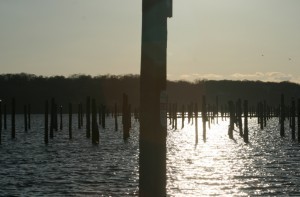
An Empty Marina -- Is This the Future of Boating? -- Photo by Tom Tripp
Regular readers know we are all about writing and being on the water. Some time ago, I wrote about how we cultivate writing in our young people. I expressed some concern that not enough kids were playing around words and exploring the deep waters of our written languages. I have the same concern about the future of boating. To put it simply, not enough of our kids are messing about in boats, and apparently, neither are their parents.
Last winter, on one of the coldest, most bitter days of the year, I was surprised to hear a cackling voice out in the snowy yard next door. I peeked out the window and saw my neighbor's 12-year old daughter cavorting merrily in the snow. What struck me most was how unusual the sight was. I never see kids playing outdoors anymore, no matter what the season. They seem to be indoors most of the time, either at some scheduled commitment or else stuck in front of a video game.
Whatever they're doing, they don't seem to be outside and they don't seem to be boating. Maybe the real problem is that, for a couple of reasons, their parents aren't boating, either.
Since the 1990s, fewer and fewer new sailboats have been delivered to the point that within a few short years, new sailboat deliveries will be virtually non-existent. The recent recession also took a huge bite out of the powerboat industry, too. And it isn't recovering yet. Couple this with the outrageous cost of gas, which is keeping the rest of the fleet either moored or up on the hard, and you just might see an entire generation of boaters check out.
If today's kids aren't learning to sail and to drive a dinghy around the harbor, they're a lot less likely to become tomorrow's cruisers, passagemakers and powerboaters.
If we don't cultivate tomorrow's writers and tomorrow's boaters, who will write for this blog?
Share on Facebook
July 10, 2011
From Rags to Riches: Advertising on Goodreads.
By Mike Jastrzebski
Over the past seven weeks I've been running an ad for The Storm Killer and Key Lime Blues (A Wes Darling Mystery)
and Key Lime Blues (A Wes Darling Mystery) on Goodreads. I was skeptical about the results, but I only invested $60.00. The ads in Goodreads are click and pay ads–you are only charged when someone clicks on the ad.
on Goodreads. I was skeptical about the results, but I only invested $60.00. The ads in Goodreads are click and pay ads–you are only charged when someone clicks on the ad.
To date I have been charged $45.20 against my initial $60.00 investment. According to Goodreads the two ads have been viewed a total of 455,242 times and 136 viewers have clicked on one or the other of the ads. There is no way of telling if the clicks result in purchases and although I keep a log of my sales I have not seen any kind of a sales jump when the ads are showing.
The following are the figures I can track:
When I started I had 35 unique users who had added my books to their lists, that number has increased to 60.
The total books added to members to-read lists has increased from 45 to 73.
Total starred ratings have gone from 25 to 33.
Total goodreads reviews have gone from 20 to 23.
The ads are not expensive. The advertiser can set his price anywhere from .10 cent per click on up. The recommended price point is .50 cents but Goodreads claims that this will not guarantee an ad will be shown more often. Clicks determine ad placement.
I started with .10 cents a click and found that my ads were not being shown often. To be fair, there were not a lot of clicks on the ads, but it was Memorial Day weekend.
I then raised my price to .50 cents a click and saw an increase in ad showings and clicks. At this time I lowered my price per click to .25 cents and I have seen a good number of clicks and showings. Again, over the past seven weeks my ads have been viewed 455,242 times.
Would I recommend advertising on Goodreads? Because it's so hard to show a direct correlation between sales and clicks, it would be hard for me to come right out and say yes. I think that as more people add me to their to-read list I will see increased sales.
I do feel it's worth another $60.00 commitment from me. I intend to advertise on Goodreads through the end of the year, and to add my new book to the ad mix when it comes out next month.
Share on Facebook
July 7, 2011
Abaco Race Week and the theory of relativity
 Albert Einstein said that time is relative, and I am certain he would have found proof for his theories had he ever attended Abaco Race Week. Einstein said time speeds up or slows down depending on how fast one thing is moving relative to something else — and for proof of that, one only need hop aboard a racing sailboat as I did this week. But I'm getting ahead of myself in the time/space continuum, so let me digress.
Albert Einstein said that time is relative, and I am certain he would have found proof for his theories had he ever attended Abaco Race Week. Einstein said time speeds up or slows down depending on how fast one thing is moving relative to something else — and for proof of that, one only need hop aboard a racing sailboat as I did this week. But I'm getting ahead of myself in the time/space continuum, so let me digress.
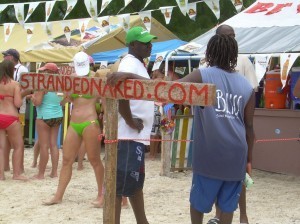 Abaco Race Week started one week ago today with the Stranded Naked Party at Fiddle Cay. There they serve Cheeseburgers in Paradise and Margaritaville Margaritas and Rum Punch mixed up in plastic garbage pails and served by the gallon.
Abaco Race Week started one week ago today with the Stranded Naked Party at Fiddle Cay. There they serve Cheeseburgers in Paradise and Margaritaville Margaritas and Rum Punch mixed up in plastic garbage pails and served by the gallon.
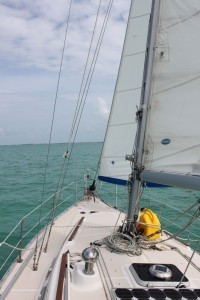 I figured I was only there for the party and that after that I would sail on to Marsh Harbor for some quiet time while the Regatta sailed off to Treasure Cay and Guana Cay. On Sunday, I had a lovely sail on my boat away from the crowds and a quiet 4th of July.
I figured I was only there for the party and that after that I would sail on to Marsh Harbor for some quiet time while the Regatta sailed off to Treasure Cay and Guana Cay. On Sunday, I had a lovely sail on my boat away from the crowds and a quiet 4th of July.
But the Regatta caught up with me on the 5th. Ashore, I ran into an old friend who was racing off Marsh Harbor on the 6th. He issued an invite to sail on a Moody 42 in Race #4 and as a writer who needs to do research, how could I say no?
Light air and a heavy boat means racing around buoys at 4-5 knots, but the crew was gifted and we managed a mid-fleet finish. And a la Einstein, I got bit by the sailboat/relativity bug that makes a slow sailboat race damned exciting.
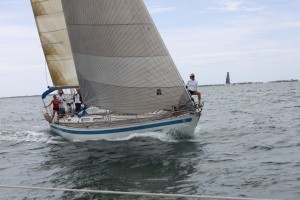 How can you explain to the uninitiated that moving through the water at five miles per hour can produce moments of heart-stopping drama? Theories and science cannot explain the thrill of that prolonged moment when the helmsman decides that though you are the port tack boat, you can surely clear the bow of that starboard tack boat that is bearing down on you. The sound of the wind and the whooshing of your wake all disappears for a moment as you hold your breath and beseech the wind gods to push you clear. And when you make it and share a grin with a crewman, time stops and hangs like Michael Jordan on a dunk.
How can you explain to the uninitiated that moving through the water at five miles per hour can produce moments of heart-stopping drama? Theories and science cannot explain the thrill of that prolonged moment when the helmsman decides that though you are the port tack boat, you can surely clear the bow of that starboard tack boat that is bearing down on you. The sound of the wind and the whooshing of your wake all disappears for a moment as you hold your breath and beseech the wind gods to push you clear. And when you make it and share a grin with a crewman, time stops and hangs like Michael Jordan on a dunk.
I was invited back for Race #5 from Marsh Harbor to Hopetown and the forecast was for heavier air. How could I resist?
C.E. wrote yesterday about the thrill/fear superfast powerboats, but I am here to suggest that the thrill of big sailboats maneuvering in close quarters is just as thrilling. And the moment when you look back and see most of the fleet behind you is heart-stopping.
 I'm a cruiser and singlehander who normally does everything I can to keep my distance away from other boats, and I came away from my race experience aboard MIKAYA with tremendous respect for the talented crew. There was the helmsman Phil who had an uncanny 360 degree sense of who was around him and in what direction they were traveling as well as a feather-light feel for every slight shift in the wind. Matt, the boat's owner and skipper, knew the idiosyncrasies of his rig and fine-tuned the sails for every puff and lift, and I watched every move to learn what I could about racing sail trim. And Rich, our mainsheet trimmer and eagle-eyed mark man could somehow spot the mark long before my old eyes could see it.
I'm a cruiser and singlehander who normally does everything I can to keep my distance away from other boats, and I came away from my race experience aboard MIKAYA with tremendous respect for the talented crew. There was the helmsman Phil who had an uncanny 360 degree sense of who was around him and in what direction they were traveling as well as a feather-light feel for every slight shift in the wind. Matt, the boat's owner and skipper, knew the idiosyncrasies of his rig and fine-tuned the sails for every puff and lift, and I watched every move to learn what I could about racing sail trim. And Rich, our mainsheet trimmer and eagle-eyed mark man could somehow spot the mark long before my old eyes could see it.
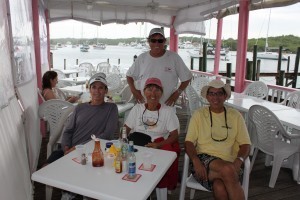
Mikaya's crew
I'm here ready to tell you that Einstein had it right because time definitely slows down when you are driving down at 7+ knots on a close reach in the middle of a pack of boats, watching your wake creaming off the bow and headed for the finish, knowing that you just might be in the money this time.
The race finished in Hopetown, but this time I couldn't go to the party as I had left my boat back in Marsh Harbor. I hopped the 5:00 ferry to get back to my boat and my dog, but the crew of MIKAYA called me on the radio when they got back from the party where the race results had been announced.
And once again, time seemed to hang. How did we do?
The voice crackled through the static across the miles we had sailed today.
We took first place in our class.
Time. Relativity. Writing.
There's one last race, but I won't make it, much as I would love to. The book beckons. As a sailing writer, it's always about finding the balance between living the experiences that go into the books and finding the time to set them down. Tomorrow is a writing day.
Fair winds!
Christine
Share on Facebook
How fast?
C.E. Grundler
For years I've moved at displacement speed, at first under sail and most recently chugging along at six to seven knots in my stocky little trawler. Displacement speed teaches patience. The horizon hangs off in the distance with oil-painting like permanency and the shoreline changes in incremental fractions. Other boats come into view, radioing their location to friends ("I'm coming up on some slow trawler,") as though you're a fixed aid to navigation and then continue on to disappear into that still unchanged horizon. You have plenty of time to think, plenty of time to remind yourself you're in no rush, after all getting there is half the fun and all those speed demons are just racing from fuel dock to fuel dock, wallets in hand. But sometimes… sometimes the 'GETTING there' part gets a bit old. There's still that other half, BEING there, especially when the weather turns ugly and 'there' is somewhere comfortable and secure, with a hot shower, dry clothes and a warm meal.
Back when I was working in a boatyard we had a hand-full of customers with insanely high-speed performance boats stop by from time to time. And on one particular occasion a fellow had launched his rocket toy and asked if anyone wanted to join him as he tested some of the latest performance tweaks he'd made to the engines. It was a slow day, none of us were doing much of anything, and my story had some chapters with a similar boat, so I said, "Sure, I'll go."
The river was glassy smooth as we set out, with the faintest hint of a breeze stirring along the Saturday morning sailors. As we cleared the mooring field my friend pushed the throttle forward, the engines roared, and I was forced backwards into my seat. The world around us seemed to freeze; at that velocity we were the only thing moving as we shot between the now motionless sailboats, and for a moment I recalled that scene in Return of the Jedi, where the speeder bikes threaded between the giant trees in the forests of Endor. Time and relativity had been turned upside down; I'm certain if I'd checked, the hands on my watch had stopped. The water beneath us had gone from a gently rolling fluid to rock hard solid, the hull banging across it like a runaway bobsled on ice as we shot beneath the Tappan Zee Bridge and past the astonished faces aboard the sloop Clearwater. Within minutes we'd covered water that would have taken me half a day's sail to navigate. I couldn't move, I don't think I even blinked, but my tearing eyes shifted to the GPS and it felt as though my heart stopped. We were travelling at 92 mph. At last we had gone full circle and I was returned to the dock, dazed and stunned as I tried to process the wild ride. It was a hell of an experience, and one I came away from a bit bruised and a lot wiser, with plenty of material for those chapters I was writing and a new-found appreciation for displacement speed.
Share on Facebook
July 5, 2011
Write By the Water
As much as the name of this blog is "Write On the Water," and as much as the subtitle is "So you want to quit your job, move onto a boat, and write," there are plenty times I'd just as soon be along the water as on the water.
Today, Tuesday after the 4th of July weekend, is one such day. A high pressure weather system is sitting over southern New England, winds are 10-12 knots from the southwest, and blue sky is all you can see from one horizon the the next.
A good day for boating? Absolutely. But it's no less beautiful for the simple joys of taking in time at the beach. And for this, nothing more than a beach towel or a beach chair is required.
As writers, we are told to avoid cliches. But let's consider the line "the best things in life are free." If you want to test the accuracy of that statement, journey down to the ocean late in the day with the sun hanging over the western sky while a warm breeze blows in over the water.
It has taken me more decades that you might imagine to learn how to go to the beach. When I was young I'd get over-heated and over-radiated. Now, in adulthood, I've found sun lotion that provides protection without covering me in a film of marshmallow, and I take in the beach for segments of a day as opposed to eight hours of human roasting.
It's not always perfect, but I've pretty much learned to spot and avoid ill-mannered kids who run across blankets kicking sand, and I am pretty good at steering clear of families who use potato chips to lure in squadrons of sea gulls burdened with weak digestive tracks. My approach might not meet everyone's taste, but by strategy is simple: find a quiet section of a quiet beach. It's as easy as that.
And if you are reader, bring your book and some water or a cool beverage. If you happen to be a writer, you have an additional option: either soak it all in, or, if you have a pen in hand, all the better – Write By The Water.
Share on Facebook
July 4, 2011
Truth is often stranger than our fiction
I have been working for almost a year on my next book, Stairway to the Bottom, and a portion of the story is driven by the fact that Boston gangster James 'Whitey' Bulger is still in hiding and has been for 16 years.
Well, that changed last week! I am 200 pages into the story and long past any section on Whitey, accept one segment of the book deals with US Marshals and FBI after a man they think knows where Whitey is hiding.
Come on, Whitey is 81 years old, couldn't he have kept moving to, say, South America or some Caribbean island? No, he hides in Santa Monica, California with a few million other retirees! I wouldn't take this personal, but he's Irish, from Boston and so and I and Mick Murphy!
What to do?
Most of the story is about the hunt for a man, a known associate of Whitey's, and how Mick Murphy is swept into it even though he doesn't want to be. The man they are looking for is running from the witness protection program and was a killer working for Bulger – not giving anything way with that info, since it comes out early in the book. The others group looking for him is an eclectic collection of retired spies that think the man on the run is an old Cold War spy who conned European governments out of millions in diamonds with the promise of supplying a list of what western government officials worked with the East Germans – this as the Berlin Wall came down.
I have gone back to the beginning and it hasn't been too hard to change the search for Whitey's location to the search for Whitey's millions.
That's not strange enough for you? How about this.
The book opens when Murphy finds out a drinking associate has jumped on a Jet Ski and headed south, saying to employees of his Jet Ski company that he's gotta run because agents are out to get him.
Well, that really happened here in Key Weird a year ago or so and the man and Jet Ski have never been found. Now try making that up. Who'd believe it?
Share on Facebook




